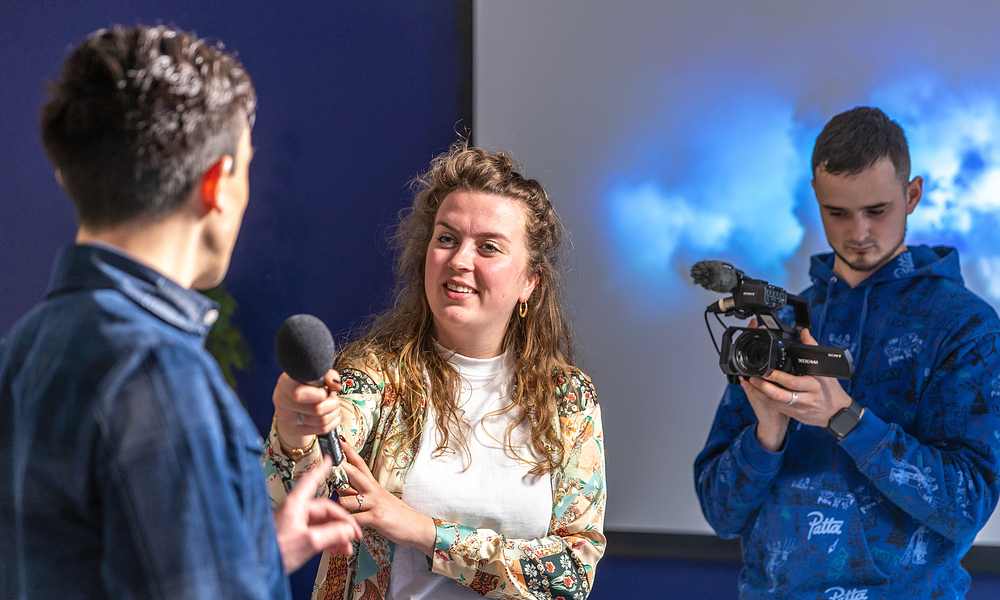Journalism
- Minor
Journalism

During this programme we want you to experience the many aspects of journalism: research, verification of sources , finding news, writing different genres of articles, interviewing, planning, filming and editing of (news) video's and podcasts as well as understanding the main characteristics of the profession of a journalist and the journalist's role within society.
You will work with small, intercultural groups of fellow students on two main projects in which you will produce a journalistic product. One of these is filmed, and the other is in print form. We believe strongly in learning by doing, and you are given freedom to choose your topic, angle and approach to the project. You are expected to produce all content yourselves and be each other's editors.
To support you in this, you have several courses in theory, writing, interviewing and multimedia skills.
Courses Period 1
Project: Multimedia Journalism (5 ECTS)
Journalism and News Theories (5 ECTS)
Interviewing and Filming (5 ECTS)
Courses Period 2
Project: Written Journalism (5 ECTS)
Writing for Journalism (5 ECTS)
Interviewing and Broadcasting (5 ECTS)
In this project you will work with up to five fellow students on creating a filmed journalism product. For example this could be a news-driven feature, a talk show, or a news programme. But we also encourage new ideas!
At the end of the project we will all sit and watch each other's films together.
Credits: 5
This introductory course explores the concept of journalism and the main activities and characteristics that surround the profession of a journalist, including the journalist's role within the society, the best practices of the profession and many ethical issues or moral dilemmas that might be encountered by exerting this profession.
In particular, the connection between journalism and democracy will be addressed, with an eye on the different media systems over the world, giving room for in-class debates and conversations. It will also be analysed the way news is considered a "product", from the moment a newsworthy fact occurs to the moment a story about that fact is made known to the public and develops over time. Last, but not least, there will be space for the most common techniques used by professional journalists to avoid manipulations, verify the reliability of their sources and contrast the dissemination of fake news.
The exam is based on questions to test the theoretical knowledge and the application of such knowledge by using case studies or actual news outlets products that require analytical and reflection skills.
Credits: 5
Interviewing is a basic element of journalism. All curiosity starts with asking questions, to yourself, but especially to others. But what kind of questions do you ask?
How do you start an interview? When does an interview actually start? How do you put someone at ease? And what if an interview doesn't go the way you want?
In this course we try to give answers to all these questions -and much more- by means of practical assignments; learning by doing.
You learn the basics of professional interviewing. In addition to theory, you will also receive training in recording an interview for the benefit of a text interview for magazine or newspaper (dialogue, monologue/full quote or mixed version) or video interview.
Next to that there will practical training in technical skills: how to use a camera, making plans and storyboards for video, photograpy and infographics.
Credits: 5
In this project you will work with up to five fellow students on creating a print magazine. You choose a main focus for the magazine and form an editorial team. It is up to you to manage the entire process, creating, selecting and editing the articles and other content, as well as organising yourselves into roles and responsibilities.
At the end of the project all groups present their magazine to the rest of the participants in the minor.
Credits: 5
This course introduces you to some commonly-used formats and types of journalism writing, such as news, features and opinion. It is assessed via a collection of self-written articles.
Credits: 5
This course is partly a follow up of interviewing & filming.
It deals with how to set up a professional interview again and in addition will also deal with live interviewing ( streaming) and podcasting.
Next to theory, you will receive training in recording an interview with emphasis on interviewing for podcast and television/live streaming.
In addition there will practical training in technical skills with the focus on use of audiovisual equipment and editing for podcast.
Credits: 5
This minor is open to all students from Hanze UAS, other universities in the Netherlands (KOM) and exchange students. You have to be in the main phase of your study. A propaeduetic certificate is not required.
For questions about the content of this minor, please contact the coordinator via the ‘Contact & FAQ’ tab above.
You can find information about the application procedures by checking the ‘Knowledge base’ in Myhanze.
You can find information about the application procedures on the website Kies Op Maat.
You can find information about the application procedures here.

Minor coordinator - available on Monday morning, Tuesday, Wednesday, Thursday morning and Friday
How satisfied are you with the information on this page?